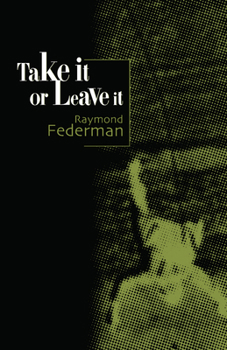Take It or Leave It
Select Format
Select Condition 
Book Overview
As told, or rather retold second-hand, by the narrator, Take It or Leave It relates the hilarious and amorous adventures of a young Frenchman who has been drafted into the U.S. Army and is being shipped Overseas to fight in Korea. The obsessed narrator retells, as best as he can, what the young man supposedly told him as they sat under a tree. He recounts how the young man escaped German persecution during World War Two, how he came to America and struggled to survive before joining the "rah rah spitshine" 82nd Airborne Division, and how, because of a "typical Army goof," he must travel in an old beat-up Buick Special from Fort Bragg to Camp Drum to collect the money the Army owes him, before he can set out for "the great journey cross-country" to San Francisco where he will embark for Overseas. Moving freely from past to present (and Vice Versa), and from place to place leap-frogging from digression to digression, Take It or Leave It explores new possibilities of narrative technique. Whie the story of Frenchy is being told, the narrator involves his listeners in digressive arguments about politics, sex, America, literature, laughter, death, and the telling of the story itself. Consequently, as this "exaggerated second-hand tale to be read aloud either standing or sitting" progresses, it also deviates from its course, and eventually cancels itself as the voices of the fiction multiply. Take It or Leave It, the ultimate postmodern novel, makes a shamble of traditional fiction and conventional modes of writing, and does so with effrontery and laughter.
Format:Paperback
Language:English
ISBN:1573660302
ISBN13:9781573660303
Release Date:July 1997
Publisher:F2c
Length:456 Pages
Weight:1.40 lbs.
Dimensions:1.1" x 5.5" x 8.5"
Customer Reviews
1 rating
A perfect experimental novel (and funny too)
Published by Thriftbooks.com User , 27 years ago
It's hard to describe this book, but it's basically a second-hand narrative of a French immigrant that joins the army, and is going to take a trip across the country on 30 days leave before he gets shipped to the Korean war. The story weaves through the past, talking about living in New York, Detroit, working in the Catskills, playing jazz sax, living with a bunch of redneck paratrooper soldiers, and the struggle to drive in the middle of the night through a horrific Vermont snowstorm so he can get his paycheck and start his trip. The story is interesting, compelling, and funny - but that's the icing on this oddly structured cake. The narrator weaves through points of view, retells parts, changes things, comes back, and keeps going. There's some experimental text here and there, where he breaks out of the traditional paragraph to express anger, rage, or confusion. And no page numbers. It's circular, confusing, entertaining, and one of the best post-modern books out there.





